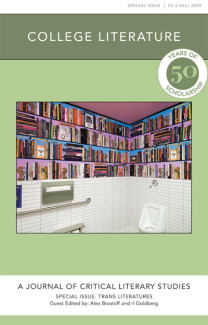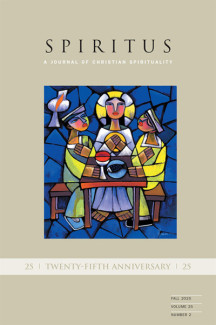
Johns Hopkins UniversityEst. 1876
America’s First Research University
Assigned Reading at Birth: Trans Literatures, Reproduction, and Redistribution

Book banning may seem a minor matter in light of recent spikes in anti-trans legislation. But as “Trans Literatures,” a special issue of College Literature: A Journal of Critical Literary Studies argues, the targeting of trans books is at once symptom and synecdoche. It is symptomatic of the anti-trans moral panic sweeping across the country and the globe; and it is synecdochic of the attempt to excise trans from public life and thus preclude trans identification and subject formation.
Anti-trans animus is spiking, yes, and at the same time, trans literature, film, and art are becoming more mainstream. One need not look to statistics to know that more visibility means more vulnerability: to surveillance, to scrutiny, to proximity to death. Visibility politics have long been a trap in trans studies, from Time Magazine’s naively optimistic proclamation of “the transgender tipping point” to the explanation of its violent paradoxes in Trap Door: Trans Cultural Production and the Politics of Visibility (2022). This, too, is symptom and synecdoche of broader social patterns of misrecognition and ambivalence about not just trans culture, but trans people themselves.
“Trans Literatures” arrives at a moment of reckoning. It does not merely grapple with the vexed implications of naming a branch of literature “trans.” Instead, it issues a staunch insistence on the reproduction and redistribution of social and material relations. It insists, in other words, on “expanding on the possible lives that authoritarianism seeks to inter.” And it offers reading as one way to do so.
In “Whose Trans Literatures?” the editorial introduction to the issue, we veer away from acts of denotative taxonomizing and toward the question of “who?” Despite the problems of locating the meanings of trans in time and place, this issue argues that gender, like literature, is iterative and malleable; this means it moves us as much as we might move with and through it. And so, gender has the capacity to redistribute the ways we relate to each other, the ways we move through the world, and how.
Trans literatures relate lessons of longing and of likeness; they enable identification. And like the literary itself, they allow us to read ourselves and others otherwise. Trans literatures aren’t simply sources of representation; they supply sources of survival. “One function of trans literature and other forms of creative expression,” as Cameron Awkward-Rich writes, “is the reproduction of trans life.”
The special issue combines scholarly articles with roundtable conversations and reviews, thinking through trans poetics and literary criticism “in the shadow of the far right,” as Jordy Rosenberg describes. It delves into the vexed problems of trans terminology, periodization, geopolitics, and abstraction, while taking the pulse on methods of reading and the material conditions of trans literary production. From “eggy strategies” to early modern trans femininity and from incarcerated trans resistance to trans*Atlantic time in the borderlands and beyond, contributors challenge and defamiliarize what constitutes trans literature, who it exists for, and what it can do.
As we note in the editorial introduction, “[t]o ask ‘Whose Trans Literatures?’...is to question structures of belonging and exclusion, to ask who is portrayed as proper subjects and who is relegated to abjection or worse.” Against the acceleration of anti-trans panic, this special issue probes the way trans literatures recast sociality and solidarity alike. It calls for “redistributing the resources we have and the ways we see the world.” It thus kindles the metaphoric and material change that trans literatures spark. Contributions to this issue ignite a blaze—one fueled by desire and one that charts a way forward.


